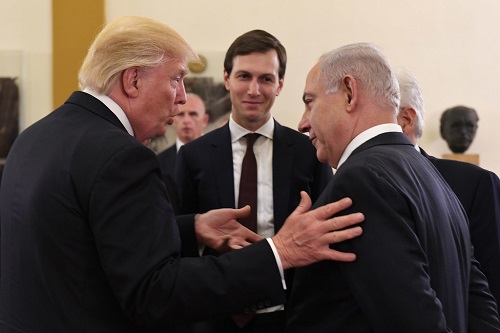IMFA photo
By
Tom Arms
Netanyahu has won a fifth term as prime minister of Israel. On the face of it this is terrible news. Benjamin Netanyahu (“King Bibi” to his supporters) is a right-wing, ultra-nationalist, militarist populist who is the biggest single obstacle to peace in the Middle East. Or is he? And if he is, is that good or bad?
Modern history has shown that the most obstinate political leaders are sometimes the best ones to achieve the required breakthrough compromise. Richard Nixon’s history as a hardline anti-communist meant that he was the only one who could open the door to Mao’s China. A similar move by a Democrat liberal would have been attacked as a “sell-out”.
It required compromise by hardliners Anwar Sadat and Menachem Begin to end decades of war between Egypt and Israel. In Northern Ireland tough men Ian Paisley and IRA leader Martin McGuinness were the only two who could have struck a workable compromise.
While Netanyahu has been beavering away at the hustings, Donald Trump’s son-in-law Jared Kushner, and his former lawyer Jason Greenblatt have spent two years hammering out a Middle East peace proposal. The plan is wrapped in the tightest of secrecy cloaks. The only ones who know the details are Kushner, Greenblatt, US Ambassador to Israeli David Friedman and Kushner and Grenblatt’s aide Avi Berkowitz. President Trump is regularly briefed on the broad brush, but his twittering fingers are kept away from the details.
Having said that, a few general thoughts have emerged. In a Washington Post op-ed in July Kushner, Grenblatt and Friedman floated the idea that the Palestinians abandon the long-held principle of the right of return in favour of a Marshall-type plan for Palestinian areas. Whether those areas involve a one-state, two-state, or even no-state or three-state solution is being kept under wraps. There is also meant to be an interesting new proposal on Jerusalem in the works.
The plan was meant to be tabled last autumn, but the Trump Administration put it back on the shelf because the likelihood of total rejection by one or both sides was too great at the time. Officials have said it will remain on the shelf until Kushner and Co think the political stars are in the perfect alignment required for success.
The re-election of Netanyahu is seen by the Trump Administration as one of those stars. One diplomat said that Trump’s recognition of Jerusalem as the capital of Israel; his withdrawal from the Iran Nuclear Accord, the closure of the Washington diplomatic office for the Palestinians; and the drastic reduction in aid for the Palestinians can be seen as part of a plan by Trump to convince Netanyahu that the American president is the best—possibly the ONLY—chance of a pro-Israel peace.
Set against that is the fact that Netanyahu has consistently opposed peace talks. The current stand-off suits him just fine. The Israelis are clearly the top dog. The Palestinians are not so much the underdog as the abandoned untermenschen of the Middle East. As such, Kushner and Co hope that the Palestinians are being backed into a corner where almost any agreement would be preferable to the current downward spiral of corruption, poverty and perpetual war.
There are also factors which could cause the stars to shift against peace. Netanyahu could go to prison on any one of several corruption charges. There is also the strong possibility that Iranian forces in Syria could throw a spanner into the works.
There are historical examples of hard-nosed, obstinate political leaders who have used the public perception of their policies to secure a legacy of peace. Unfortunately they are the exception rather than the rule. There is nothing in Netanyahu or Trump’s history which indicates that either of them will turn from the politics of fear and division towards peace. But they are uniquely positioned to do so. If either ignores the opportunity then the election of Bibi is the major setback it appears on the surface to be.
Tom Arms
I am a journalist, entrepreneur and historian with extensive experience in print, web and broadcast journalism. I started as a diplomatic correspondent, wrote several books (The Falklands Crisis, World Elections On File and the Encyclopedia of the Cold War), and then in 1987 started my own business (Future Events News Service, www.fensinformation.com) which over 25 years established itself as the world and UK media’s diary. Our strapline was: “We set the world’s news agenda.” I sold FENS in December 2012 but retained the exclusive broadcast rights to all of FENS data. To exploit these rights I set up LookAhead TV which produces unique programmes which “Broadcasts Tomorrow Today” so that viewers can “Plan to Participate.” LookAhead has appeared regularly on Vox Africa, Radio Tatras International, The Conversation and Voice of Africa Radio.
In addition to being a syndicated broadcaster and columnist on global affairs, Tom is also available for speaking engagements and can be contacted on Twitter, Linkedin and email: [email protected]



Very interesting take. Bibi is not Begin and Trump is not Carter. With Bibi’s win the stage us set to announce the annexation. Of Area C snd B leaving poor Mahmoud Abbas with his principality of Ramallah and few towns with less than 10% of the 22% of historic Palestine. To me this is welcoming news since it prove the Two States touted by thé US and the PLO is a fraud and a lie and time to move forward toward the OneState for All of its People www.1not2.org